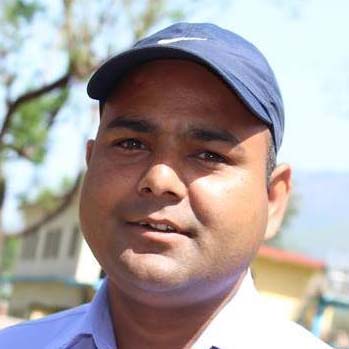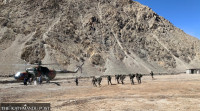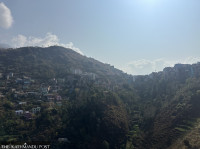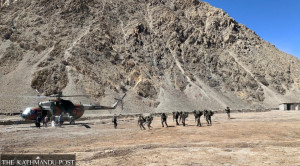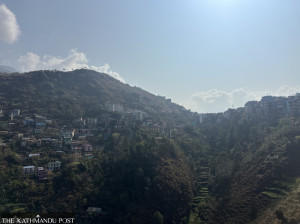Karnali Province
Herb collectors stuck in snow start returning home
Thirty-four people from Tatopani Rural Municipality had left for the highlands to collect Setak Chini. After two weeks of getting caught in the snow, 24 people have returned while others are making their way home.
Krishna Prasad Gautam
The residents of Tatopani Rural Municipality-8 in Jumla have started returning home in batches after two weeks of being trapped in the snowfall in the upper regions of the district.
Thirty-four people from the rural municipality had gone to the highlands to collect Setak Chini, locally known as Khiraula, a medicinal herb collected for its roots, and were caught in the snow since February 6. As of February 10, 24 of them had returned and 12 were still in the highlands.
The Karnali provincial government had sent a Nepal Army helicopter to rescue the trapped herb collectors on February 6. However, the helicopter could not land due to adverse weather conditions. It dropped some biscuits and noodles for the stranded and returned.
Eighteen people were stranded at Gragra, nine in Adiodar and seven at Khotesalla in Tatopani Rural Municipality.
According to the chief of the Disaster Management Branch under the Ministry of Internal Affairs and Law Krishna Bahadur Rokaya, most of the herb collectors had gone prepared to the highlands with clothing and food but the cold could have led to health issues.
“And with transportation cut off, it was necessary to conduct a rescue operation,” said Rokaya. “But the weather did not permit landing. At least, they are making their way home now.”
Chief District Officer of Jumla Vijayakumari Prasai said two other people—46-year-old Moon Rawat and 37-year-old Devi Shahi from Tatopani Rural Municipality—who had also gone to the highlands to collect Khiraula were found dead trapped in the snow on December 6.
“They were not in the group of 34. They had left separately and got caught in the snow,” he said.
Karnali folks go to the highlands every year to collect Setak Chini, found in all mountainous districts of the province. The selling price of the herb’s roots in the local villages is anywhere between Rs 80-Rs 100 per kg while the same herb is sold at Rs 250-Rs 300 per kg in the urban markets such as in Surkhet and Nepalgunj.
Those living in high altitude settlements make their livelihood from the collection and sale of medicinal herbs and several families leave for the highlands during the herb collecting season despite risks.
Laxman Pandey of Haku village in Tatopani Rural Municipality-4 said that herb collectors start ascending the highlands of the rural municipality in December. According to him, they pitch temporary tents or stay in caves in the highlands during Setak Chini collecting season.
In the past year, 20 people who had gone to collect Setak Chini in Tamti of Tatopani in Jumla were trapped in the snow. They were rescued by a helicopter sent by the provincial government.
In January last year, seven people from Jumla, who had gone to the highlands in Kushe Goupalika-9 of Jajarkot in search of Setak Chini, were trapped in the snow. The provincial government had sent helicopters to rescue them but they failed to land.
“The trapped people returned a week later after the snow began to melt,” said Ramchhaya Kumari Shahi, vice chairman of Kushey Rural Municipality. “The people of Karnali have to risk their lives and expose themselves to danger every year.”
According to the data of the Provincial Police Office, 144 people were trapped in the snow in the last three fiscal years while 19 people died in an avalanche in the same time period. After a snowfall last year, 39 people were reported missing in the snow in various districts of Karnali.
“The residents of mountain settlements in Humla, Mugu and Kalikot leave the villages before snowfall begins. The ones who get trapped in snowfall are usually herb collectors in the highlands of Tatopani in Humla, Kuse and Chakhure Patan in Jajarkot,” said DIG Ganesh Bahadur Air.
"Every year, Karnali residents make their way to the highlands and get caught in the snow. The government has been sending helicopters to places where security personnel cannot reach by road or on foot,” said Air. “Six years ago, we could not rescue those who went to collect yarsagumba at Tangtung Lake in Dolpa. Sixteen people died in an avalanche and about 3,000 local residents couldn’t come out of their homes for two weeks.”




 9.89°C Kathmandu
9.89°C Kathmandu